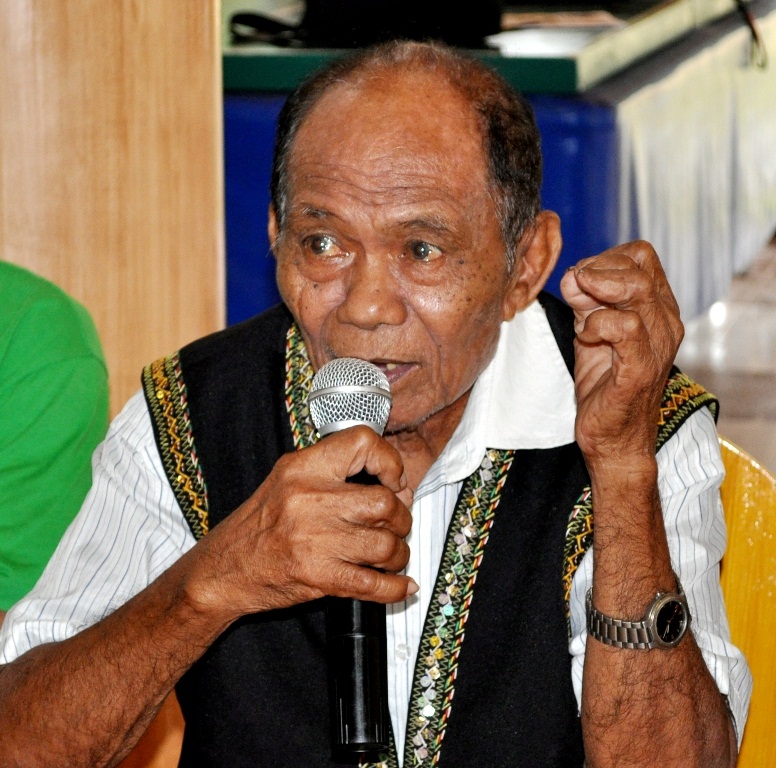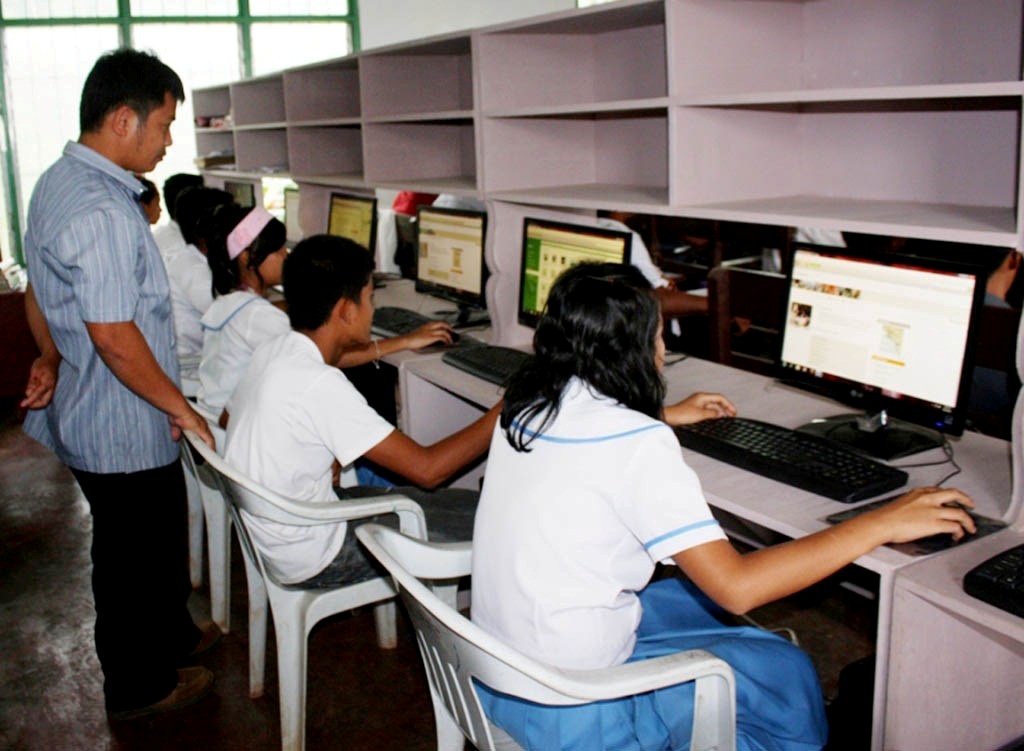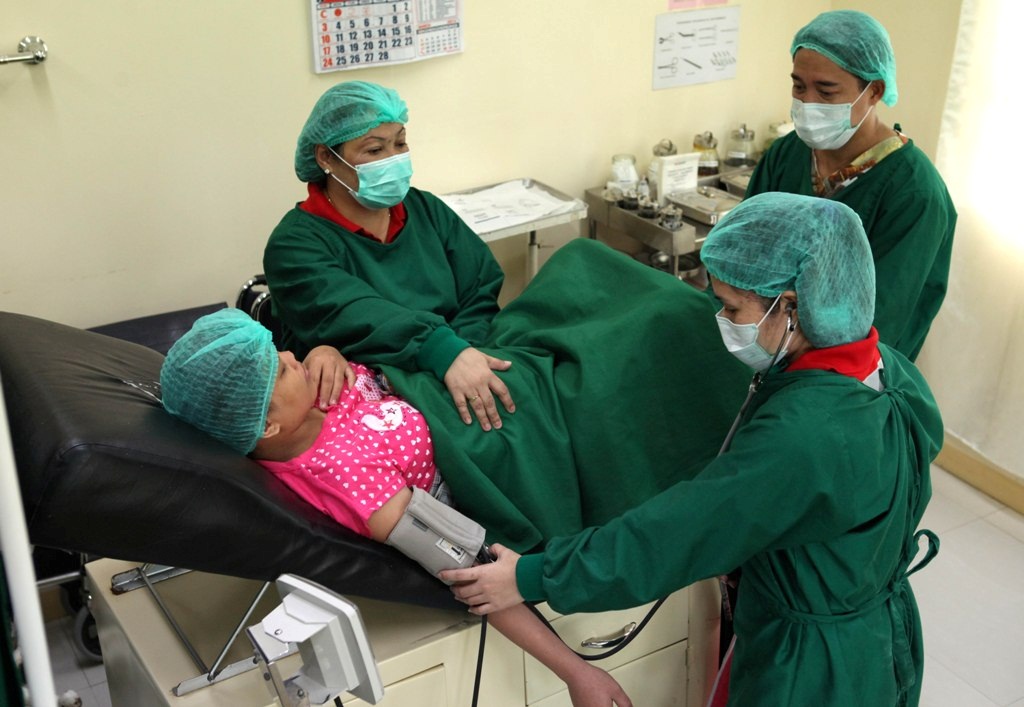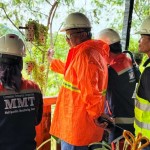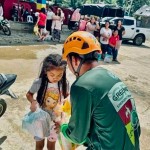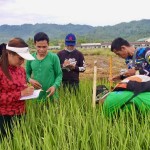-
Balawing: “The stories on environmental destruction I’ve been hearing about TVI are simply not true. Those were just stories meant to stop us from believing that there is responsible mining after all.”
-
Computer literacy. Canatuan National High School teaches its students the basics of sending emails. Supported by TVIRD, the school benefits from textbooks, instructional materials and computers with internet connection.
-
Sufficient health services. Medical personnel of the mine site clinic include doctors, midwives and nurses. It is equipped with a birthing unit that delivers an average of 12 live births every month.
Timuay Liberato Balawing and six other leaders of Subanon tribes in Zamboanga del Norte visit Canatuan; acknowledge TVIRD’s industry best practices
Siocon, Zamboanga del Norte / June 2013 – While a lot had been documented about responsible mining, the credibility of a responsible miner is best experienced on-site and personally talking to kinfolk who benefit from its operations.
Timuay Labi or Supreme Chieftain Liberato Balawing of the Subanon tribe has been hearing the term ‘responsible mining’ but was cynical about it. Every single day, the chieftain sees how illegal miners destroy the lands of his ancestors in Sindangan town, 157 kilometers North of Canatuan.
Just recently, the supreme chieftain, along with lay leaders from the Roman Catholic Church and tribal leaders in the municipalities of Siayan, Sindangan, Leon Postigo and Godod in Zamboanga del Norte Province visited the mine site of TVI Resource Development Philippines Inc. (TVIRD) in Canatuan. They wanted to see for themselves TVIRD’s brand of responsible mining.
The company is a locally-owned company and affiliate of Canada’s TVI Pacific Inc. It is currently operating its copper and zinc mine in the area, which is home of Balawing’s kinfolk. The Subanons have been the company’s hosts since the mid 1990’s when TVIRD began explorations and later began operations in 2004.
Demystified with the Canatuan experience
“It is different when you see it personally. The stories on environmental destruction I’ve been hearing about TVIRD are simply not true. Those were just stories meant to stop us from believing that there is responsible mining after all and it is happening here,” Balawing said.
“I will tell fellow members of the Knights of Columbus (K of C) what I saw here. I will tell them the benefits that TVIRD has given to Siocon – the employment of the natives, the good roads and the rehabilitation it is doing to the mined-out areas,” said Sir Knight Virgilio LLorente, District Deputy of Sindangan K of C, a Civil Engineer and a resident of the town.
To date, Subanons comprise nearly 30% of TVIRD’s workforce while almost 90% of the workforce, including Subanons, is from the Zamboanga Peninsula. The company also invested in roads and bridges in the area. At the present time, TVIRD has constructed and currently maintains the 45-km Baliguian road and the 16-km Paduan-Candiz-Tungawan farm-to-market roads. Including the 79-km thoroughfare linking Siocon to RT Lim, TVIRD maintains a road network of 140 kilometers at an annual maintenance cost Php19 million.
Balawing’s group was toured around the mining facilities of the company. Facilities they visited included the Sulphide Tailings Storage Facility or the Sulphide Dam, the 31-hectare mine pit, satellite nursery and Tanuman Village, where Subanons affected by the company’s mining operation were resettled.
The government’s partner in development
Community Relations and Development Office Manager Joel Alasco said TVIRD literally becomes the surrogate of the government while it operates in Canatuan.
“From the time we set foot in the area, TVIRD has been providing basic social services, not only to the host community but to nearby municipalities. Health, education, livelihood and infrastructure support has been continuously provided where it is needed most,” he said.
Alasco said TVIRD hired additional teachers and built school buildings to provide education to the Subanons. It also provided eligible students with college scholarships in order to nurture professionals who will come back and help improve the lives of their kinsmen.
“To date we have 55 college scholars studying in the different parts of the Peninsula. Those who graduated a few years back are either employed by the company, like our clinic nurse, or employed outside Canatuan,” he shared. In the course of TVIRD’s operations, the company’s program cultivated young Subanon professionals in the fields of medicine, forestry and education. There are also Subanon vocational electricians and midwives.
Canatuan is also the only mountain school in Zamboanga del Norte that has school buses. In addition to this, TVIRD also provides textbooks, computers, internet connection and electricity.
Alasco said the Social Development Management Plan or SDMP mandated by the Mining Act is followed to the letter by his office. He also disclosed that in implementing the SDMP, a community technical working group has been created in every barangay of the host municipality to be assured that projects are relevant to the people.
“We have regular meetings with our Subanon partners so they can suggest what projects are needed. This is how both parties practice the rights to self determination. We’re giving them the right to determine their economic, social and cultural development. We don’t dictate. We listen to their suggestions,” he concluded.
Public health
“Our clinic, with free ambulance services and medicine, is open 24 hours a day to whomever comes for consultation and treatment – be it a Canatuan resident or residents from nearby towns of Baliguian and Sirawai in Zamboanga del Norte, and RT Lim and Tungawan in Zamboanga Sibugay,” company doctor Ulysses Silorio said. In 2012 alone, the clinic received close to 14,000 consultations and admissions.
“This is what amazes me. You have a clinic with a birthing unit that serves everybody. Our clinic back home does not even have a birthing unit,” said Sindangan town women’s representative Grace Llorente, who toured with Timuay Balawing.
“I have to correct bad stories about TVIRD that I’d been hearing before,” she disclosed. Like Balawing, LLorente committed to share what she saw in Canatuan to other members of the civil society organizations in her hometown.
Right to self determination
“Even if it is a Canadian (foreign-invested) mining company, it did not neglect the natives like us. It has given importance to (the Subanons’) sustainable livelihood. It built houses for them, provided rubber seedlings and rehabilitated disturbed areas,” Balawing told a visiting foreign guest who was with them during the mine tour and who interviewed the Timuay to get his impression of TVIRD.
Balawing later explained that he wanted to convey a message to the foreign guest to tell her that he neither sees exploitation to his kinfolk nor abuse of their ancestral lands in Canatuan.
“I saw they are well taken care of. Many of them have regular income. The Subanon farmers are assisted not only with technology but by giving them free rubber seedlings. The education of their children is assured,” he added.
Balawing admitted the Subanons have experienced so much abuse, some from Subanon tribal leaders and people from government who only used the tribe for their own selfish interest.
“But in Canatuan, it seems people from TVIRD talk less but work more to protect the environment and serve the people,” he said.
The people’s right to self-determination is a fundamental principle in international law. It is embodied in the United Nations Charter and the International Covenant on Civil and Political Rights and the International Covenant on Economic, Social and Cultural Rights.
Balawing’s demeanor does not show his royal blood. His humility and astuteness as leader of his people, however, can be seen whenever he speaks on behalf of his people. He speaks little, yet the relevance of his words speaks volumes about his person and the principles that he stands by – that a leader should serve first, receive benefits last, work for the common good and consult his people.
Download PDF
Download Word Document

